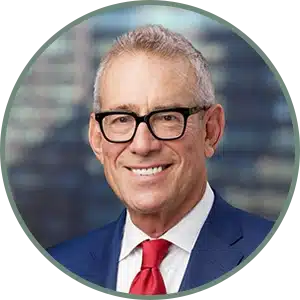
Content Reviewed by:
Steven M Levin
Content Reviewed by: Steven M Levin
Accordion Content
Since 1976, Steve Levin has been dedicated to helping people injured by others’ negligence. He is one of the first attorneys in the U.S. to prosecute nursing homes for abuse and negligence. He’s also helped write new legislation that governs the operation of nursing homes, including the Illinois Nursing Home Care Act. Moreover, Levin & Perconti has obtained the top three jury verdicts in nursing home negligence cases in Illinois.
Regional Ombudsmen Serve as Lifeline for Nursing Home Residents – And So Much More
Under the federal Older Americans Act (OAA), every state must have an Ombudsman Program that addresses complaints and advocates for improvements in the long-term care system. Each state has an Office of the State Long-Term Care Ombudsman (Office), headed by a full-time State Long-Term Care Ombudsman (Ombudsman) who directs the program statewide. Across the Nation, staff and thousands of volunteers are designated by State Ombudsmen as representatives to serve residents directly.
According to the Administration on Aging (AoA)/Administration for Community Living (ACL):
- The network has 5,947 volunteers certified to handle complaints and 1,362 paid staff.
- Nationally, in 2019 the Ombudsman program investigated over 198,502 complaints.
- In addition, the group has provided information on long-term care to another 425,084 people.
When a resident does not have family or friends who can visit them regularly, Regional Ombudsmen or Ombudsman Volunteers may be the only persons available to help identify a problem, report care concerns, and act as a voice for those who have been neglected, forgotten, or abused. Ombudspersons are advocates for residents of nursing homes, board and care homes, and assisted living facilities. They serve as a valuable resource to families, residents, and staff and provide information about finding a facility and what to do to get quality care. Most important, though, they are trained to resolve problems.
Frequently Asked Questions About the Ombudsman Program in 2021
(Provided by the National Long-Term Care Ombudsman Resource Center)
Q: Who does the Ombudsman program represent?
The Ombudsman program’s mandate is to represent the resident and assist at their direction. The Older Americans Act (OAA) requires the Ombudsman program to have resident consent before investigating a complaint or referring a complaint to another agency. In addition, when someone other than the resident files a complaint, the ombudsman must determine, to the extent possible, what the resident wants.
Q: What happens after I bring a concern to the Ombudsman program?
Suppose someone other than a resident contacts the Ombudsman program with a complaint. In that case, the ombudsman will visit the resident to see if the resident has similar concerns and wants to pursue the complaint. The ombudsman will explain the role of the program, the complaint investigation process, share information about residents’ rights, ask about the resident’s quality of life and care, and seek to understand the resident’s capacity to make decisions. As a result, many residents, even residents with dementia, can express their wishes.
If the resident wants the ombudsman to act on the problem, the ombudsman will investigate the complaint and continue communicating with the resident throughout the investigation process. If the resident cannot provide consent, the ombudsman will work with the resident representative or follow program policies and procedures if the resident does not have a representative.
Q: What types of complaints does the Ombudsman program investigate?
Ombudspersons handle a variety of complaints about the quality of life and care. Not all complaints are about the care provided by a facility, and some complaints are about outside agencies, services, or individuals (e.g., Medicaid or Medicare benefits). They can also receive and respond to complaints from individuals other than the resident (e.g., family member) but still need resident permission to investigate or share information.
Q: Do ombudspersons investigate complaints involving allegations of abuse, neglect, and exploitation?
Yes. The Ombudsman program investigates and resolves complaints that “relate to action, inaction or decisions that may adversely affect the health, safety, welfare, or rights of the residents,” and that includes complaints about abuse, neglect, and exploitation.
Ombudsmen are directed by resident goals for complaint resolution and limited by federal disclosure requirements. Therefore, the Ombudsman program’s role in investigating abuse allegations is unique and differs from other entities such as adult protective services and state licensing and certification agencies.
Ombudsman programs attempt to resolve complaints to the residents’ satisfaction (including those regarding abuse) and do not gather evidence to substantiate that abuse occurred or determine if a law or regulation was violated to enforce a penalty.
If necessary, with resident consent or permission of the State Ombudsman, if the resident can’t consent and does not have a legal representative, the ombudsman will disclose resident-identifying information to the appropriate agency or agencies for regulatory oversight; protective services; access to administrative, legal, or other remedies; or law enforcement action about the alleged abuse, neglect or exploitation.
Q: Is the Ombudsman program required to report allegations of abuse?
There are strict federal requirements regarding disclosure of Ombudsman program information. For example, resident-identifying information cannot be disclosed without resident consent, the consent of the resident representative, or court order. Therefore, these disclosure requirements prohibit Ombudsman programs from being mandatory reporters of suspected abuse.
Q: How do I find more information about the Ombudsman program and contact an ombudsman?
Visit the National Long-Term Care Ombudsman Resource Center (NORC) website (www.ltcombudsman.org) to learn more about the program. Locate an Ombudsman program by clicking “Visit Our Map.”
Working With the Illinois Long-Term Care Ombudsman Program
The individuals working through the Illinois Long-Term Care Ombudsman Program are crucial in protecting the rights of residents who are disabled, abused, neglected, and those without family and who may have a hard time advocating for themselves. Ombudsmen oversee assigned regions across the state and stay focused on these six primary goals.
- Advocating to improve the quality of care and quality of life for residents of long-term care facilities in Illinois.
- Empowering seniors and adults with disabilities to self-advocate.
- Providing information to residents about residents’ rights, long-term care options, supports, and services in nursing facilities and the community.
- Investigating complaints and concerns. Ombudsmen will work to resolve complaints to the satisfaction of residents.
- Listening to understand an issue from the resident’s perspective.
- Maintaining confidentiality. Ombudsmen may not discuss or disclose any information without the individual’s permission.
Currently, there are nearly 20 regional Ombudsmen and Deputy State Long-Term Care Ombudsmen and consultants, dozens of volunteers, and accompanying provider agencies that support the state of Illinois and work to uncover the more complex and challenging issues plaguing nursing homes today. This might include insufficient staffing, medication errors, wrongful eviction, infectious disease concerns related to COVID-19, and neglect and abuse claims.
Since Ombudsman services are free to most, current nursing home residents, family members, and friends can contact them without financial stressors. In Illinois, the Ombudsman program services are available free of charge to:
- Person(s) 18 or older who is/are either a current resident, a prospective resident or a former resident of a long-term care facility;
- Friends and relatives of persons who live in long-term care facilities;
- Long-term care facility staff members and administrators with resident-related concerns;
- Individuals and families who are considering long-term care facility placement as a long-term care option;
- The community-at-large; and
- Other interested groups concerned about the welfare of residents of long-term care facilities.
Ombudsman Program contact information is available through the Illinois Department of Aging and categorized by regions and counties served.
Contacting a Local Ombudsman in Your Community
Several trained volunteers identified through the Long-Term Care Ombudsman Program also advocate for working through common resident complaints related to food, room accommodations, and facility accessibility. Still, they are also present to listen to residents while having regular friendly and trusted visits. Ombudsman Program volunteers are beneficial to residents who may not have family or friends who visit them often as these residents are more likely to be abused and neglected.
Please know in advance that Ombudsman programs do not:
- Conduct licensing and regulatory inspections or investigations;
- Perform Adult Protective Services (APS) investigations; or
- Provide direct care for residents.
To learn more about these Ombudsman volunteer opportunities and help advocate for the rights of older adults, call 1-800-252-8966. You may also be connected to the Illinois Department on Aging Senior HelpLine and the Regional Long-Term Care Ombudsman Program in your area by visiting this webpage.
Nursing home employees need help too and are encouraged to call the nursing home whistleblower hotline at 312-332-2872 with issues and complaints. All calls and consultations are confidential.
Illinois Injury Lawyers Also Help Protect the Rights of Long-Term Care Residents
The Illinois Ombudsman Program was mandated under the Federal Older Americans Act and the Illinois Act on Aging. And while Ombudsmen can play a significant role in advocating for those in nursing homes, some situations in violation of those Acts will require the attention of an experienced attorney. The nursing home lawyers at Levin & Perconti have represented residents who have been abused, injured, or neglected in nursing homes throughout Illinois when an Ombudsman could no longer help. We seek justice and fair compensation.
If you suspect neglect or abuse of a loved one in a nursing home, please contact us now for a FREE consultation with one of our attorneys. Call us toll-free at 1-877-374-1417, in Chicago at 312-332-2872.



